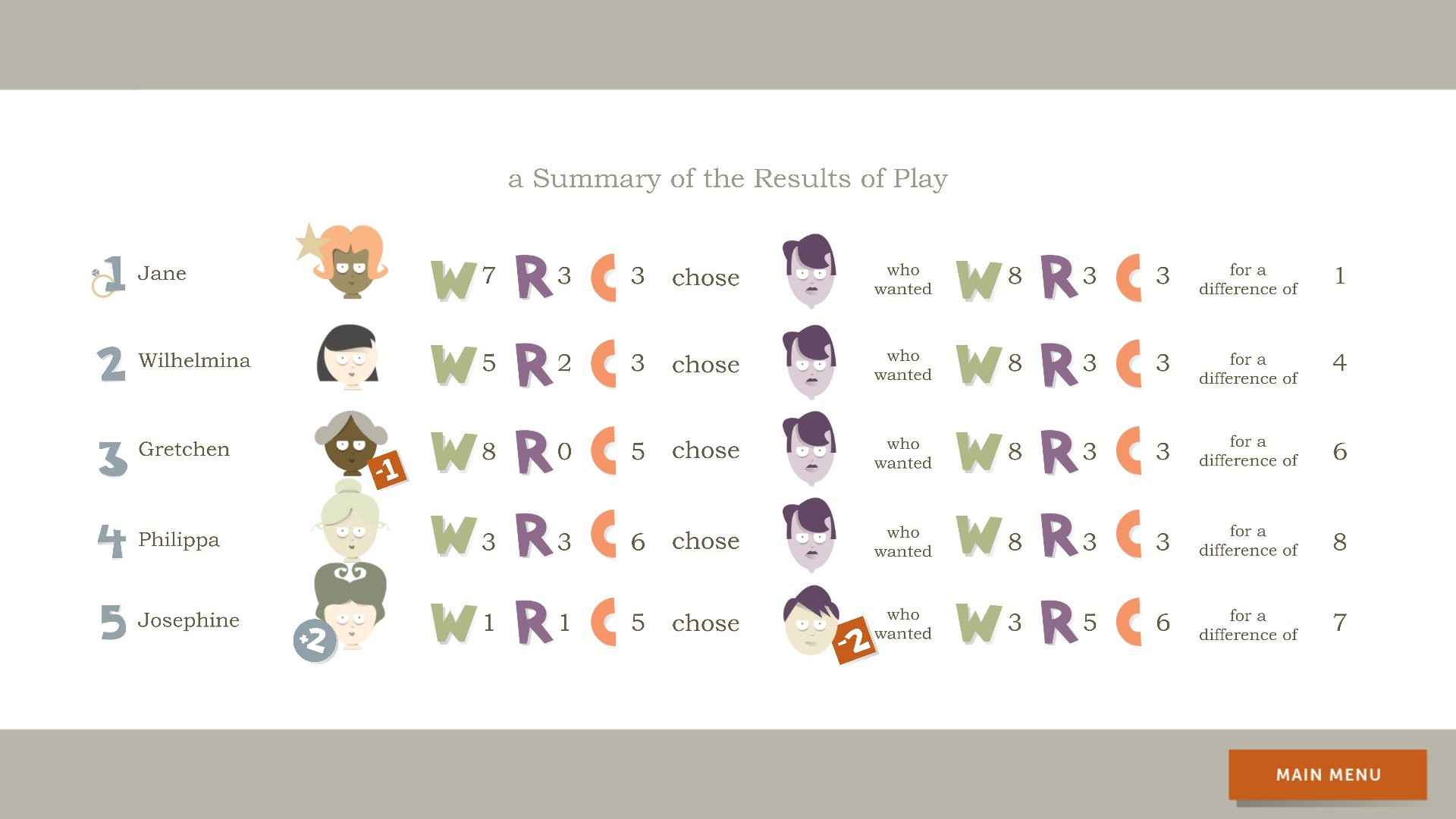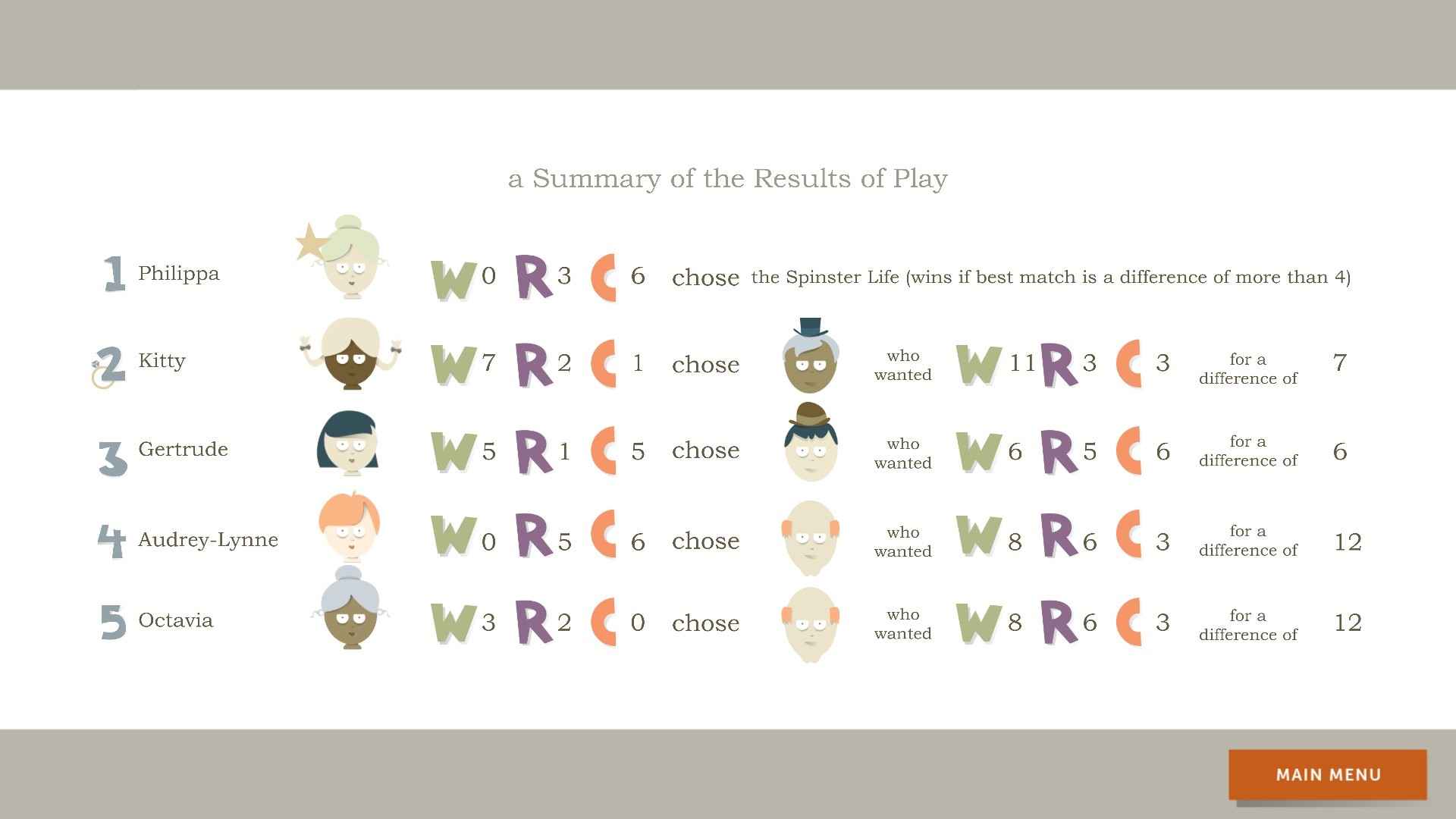Are you new to Austen Translation? Did you played the tutorial of the game but still having a hard time understanding how scoring works? If the answer is yes, then we’re here to give you the details that you may have missed during the tutorial session of Austen Translation.
In this guide, we will be breaking down the details of how the scoring works in the game. Without further ado, let’s get started.
How Scoring Works in Austen Translation
The object of the game is to obtain the lowest score. The score is calculated by taking the numerical difference between your traits and the bachelor’s desired traits and adding/subtracting any modifiers.
Traits
Your goal is to get your traits as close to your chosen bachelor’s desired traits as possible by playing cards. Note that if a bachelor desires a certain number of a trait, e.g., three wits, he wants exactly three wits and no more; increasing your wit beyond this point decreases your score (a gentleman can’t be outshone by his wife now, can he?).
Modifiers
Certain cards can be played to a bachelor to make him less desirable. While these appear as negative modifiers, they are actually added to the final score, i.e. if a bachelor has a negative modifier of -2, two points will be added to the score of any couple of which he is a part. Other cards can be played directly to a rival to increase her final score.
The player in the last place will receive an extra event before the final chapter (“A Last Ditch Opportunity”). She will have the opportunity to either answer a trivia question about her chosen bachelor based on the chapter intro text (“Steer the Conversation…”) or refuse to do so (“Play hard to get.”). Answering the trivia question correctly earns you a +2 modifier with that bachelor (2 points subtracted from your final score with that bachelor). There is no penalty for answering incorrectly.
Playing hard to get gives you a 50/50(?) chance of obtaining a +2 modifier; since the trivia question has four multiple-choice options, this is generally better than guessing.
An Example

- Jane: W(8-7) + R(3-3) + C(3-3) = 1
- Wilhelmina: W(8-5) + R (3-2) + C(3-3) = 4
- Gretchen: W(8-8) + R (3-0) + C(5-3) + 1 (modifier) = 6
- Philippa: W(8-3) + R (3-3) + C(6-3) = 8
- Josephine: W(3-1) + R (5-1) + C(6-5) + 2 (his modifier) – 2 (her modifier) = 7
Itinerary
Each game consists of four chapters, during which the rivals can play cards. Events occur in a set order.
The player chooses an initial bachelor upon starting the game:
Chapter 1 – Each rival chooses a card to play
And just how did that go over? – The player’s chosen bachelor reacts to her last action (this can be a good way to suss out unknown preferences!)
Chapter 2 – Each rival chooses a card to play
A Stolen Moment With Her Bachelor – The player’s chosen bachelor reveals where she stands in his preference order (his top choice receives four hearts, his next choice receives three, etc.)
Chapter 3 – Each rival chooses a card to play
The Couple to Beat – The couple with the lowest score is shown.
The Plot Twist – A random event occurs. This may eliminate one bachelor, prevent a certain bachelor-rival pairing, or make a certain trait more or less desirable to all bachelors.
A Last Ditch Opportunity – The player in the last place is presented with an opportunity to increase her standing with her chosen bachelor by answering a trivia question based on the text preceding previous chapters.
The rivals have a final opportunity to switch bachelors and everyone’s chosen bachelor is revealed
Chapter 4 – Each rival chooses a card to play; one player may attempt a spinster victory.
Epilogue – Each bachelor proposes to the rival with whom he has the lowest score. The victorious couple celebrates their wedding and the fate of the rest of the cast is revealed.
Victory Conditions
There are two types of victories in the game: marriage victories and spinster victories.
Marriage Victory
A marriage victory is obtained by receiving and accepting a proposal. After the final chapter, each bachelor will propose to the rival whose traits most closely match his desired traits, i.e. the rival with whom he will have the lowest score. A rival will accept a proposal only from the bachelor she selected before the final chapter.
If two rivals obtain and accept proposals, the couple with the lower score will be victorious; the other will meet a tragic (randomized) fate. If two couples have the same score, a double wedding is announced and both players win.
Spinster Victory
A rival whose traits don’t match up well with any of the bachelors’ expectations can still achieve victory by pursuing a life of spinsterhood. This option always appears as a card during the last event and can only be chosen by one rival.
The newly-minted spinster wins if there are no accepted proposals or if all couples have a score greater than four. The spinster victory trumps a marriage victory. If a player wins through a spinster victory, all of her rivals lose, even if they have received and accepted proposals.

In this example, Kitty has obtained a proposal but her score is greater than four; therefore Philippa wins with a spinster victory.
Conclusion
And that’s all for this Austen Translation guide. Are you still confused about how the scoring works in the game? If yes, feel free to leave a comment below. This guide has been made possible by Wriken.



